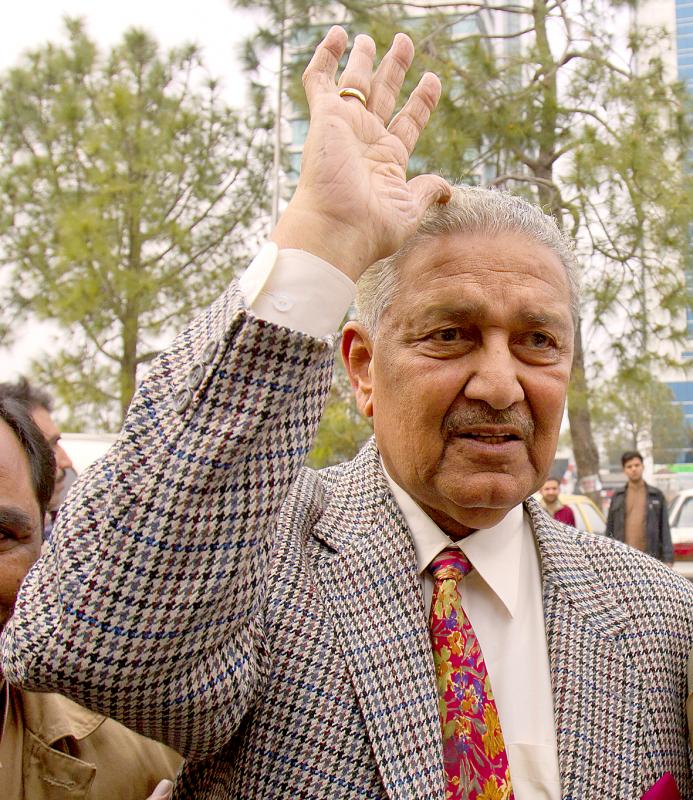Abdul Qadeer Khan, who died yesterday, was lauded in Pakistan for transforming it into the world’s first Islamic nuclear weapons power.
However, he was seen by the West as a dangerous renegade responsible for smuggling technology to rogue states.
The nuclear scientist, who died at 85 in Islamabad after being hospitalized with COVID-19, was revered as the “father of Pakistan’s nuclear bomb.”

Photo: EPA-EFE
He was seen as a national hero for bringing the country up to par with archrival India in the atomic field and making its defenses “impregnable.”
However, he found himself in the crosshairs of controversy when he was accused of illegally proliferating nuclear technology to Iran, Libya and North Korea.
Khan was placed under effective house arrest in the capital Islamabad in 2004, after he admitted to running a proliferation network to the three countries.
A court ended his house arrest in February 2009, but his movements were strictly guarded, and he was accompanied by authorities every time he left his home in an upscale sector of Islamabad.
Born in Bhopal, India, on April 1, 1936, Khan was just a young boy when his family migrated to Pakistan during the bloody 1947 partition of the subcontinent at the end of British colonial rule.
He did a science degree at Karachi University in 1960, then went on to study metallurgical engineering in Berlin before completing advanced studies in the Netherlands and Belgium.
The crucial contribution to Pakistan’s nuclear program was the procurement of a blueprint for uranium centrifuges, which transform uranium into weapons-grade fuel for nuclear fissile material.
He was charged with stealing it from the Netherlands while working for Anglo-Dutch-German nuclear engineering group Urenco, and taking it to Pakistan in 1976.
On his return to Pakistan, then-Pakistani prime minister Zulfikar Ali Bhutto put Khan in charge of the government’s nascent uranium enrichment project.
By 1978, his team had enriched uranium and by 1984, they were ready to detonate a nuclear device, Khan later said in a newspaper interview.
The 1998 nuclear test saw Pakistan slapped with international sanctions and sent its economy into freefall.
Khan’s aura began to dim in March 2001 when then-Pakistani president Pervez Musharraf, reportedly under US pressure, removed him from the chairmanship of Kahuta Research Laboratories and made him a special adviser.
After Islamabad received a letter from the International Atomic Energy Agency containing allegations that Pakistani scientists were the source of sold-off nuclear knowledge, Khan was questioned.
In a speech, he told the Pakistan Institute of National Affairs in 1990 that he had dealings on world markets while developing Pakistan’s nuclear program.
It was taken as a confession, but Khan was pardoned by Musharraf. Later, he retracted his remarks.
“I saved the country for the first time when I made Pakistan a nuclear nation, and saved it again when I confessed and took the whole blame on myself,” Khan said in an interview in 2008.
After Islamabad carried out atomic tests in 1998 in response to tests by India, Khan said Pakistan “never wanted to make nuclear weapons. It was forced to do so.”

Asian perspectives of the US have shifted from a country once perceived as a force of “moral legitimacy” to something akin to “a landlord seeking rent,” Singaporean Minister for Defence Ng Eng Hen (黃永宏) said on the sidelines of an international security meeting. Ng said in a round-table discussion at the Munich Security Conference in Germany that assumptions undertaken in the years after the end of World War II have fundamentally changed. One example is that from the time of former US president John F. Kennedy’s inaugural address more than 60 years ago, the image of the US was of a country

‘UNUSUAL EVENT’: The Australian defense minister said that the Chinese navy task group was entitled to be where it was, but Australia would be watching it closely The Australian and New Zealand militaries were monitoring three Chinese warships moving unusually far south along Australia’s east coast on an unknown mission, officials said yesterday. The Australian government a week ago said that the warships had traveled through Southeast Asia and the Coral Sea, and were approaching northeast Australia. Australian Minister for Defence Richard Marles yesterday said that the Chinese ships — the Hengyang naval frigate, the Zunyi cruiser and the Weishanhu replenishment vessel — were “off the east coast of Australia.” Defense officials did not respond to a request for comment on a Financial Times report that the task group from

BLIND COST CUTTING: A DOGE push to lay off 2,000 energy department workers resulted in hundreds of staff at a nuclear security agency being fired — then ‘unfired’ US President Donald Trump’s administration has halted the firings of hundreds of federal employees who were tasked with working on the nation’s nuclear weapons programs, in an about-face that has left workers confused and experts cautioning that the Department of Government Efficiency’s (DOGE’s) blind cost cutting would put communities at risk. Three US officials who spoke to The Associated Press said up to 350 employees at the National Nuclear Security Administration (NNSA) were abruptly laid off late on Thursday, with some losing access to e-mail before they’d learned they were fired, only to try to enter their offices on Friday morning

STEADFAST DART: The six-week exercise, which involves about 10,000 troops from nine nations, focuses on rapid deployment scenarios and multidomain operations NATO is testing its ability to rapidly deploy across eastern Europe — without direct US assistance — as Washington shifts its approach toward European defense and the war in Ukraine. The six-week Steadfast Dart 2025 exercises across Bulgaria, Romania and Greece are taking place as Russia’s invasion of Ukraine approaches the three-year mark. They involve about 10,000 troops from nine nations and represent the largest NATO operation planned this year. The US absence from the exercises comes as European nations scramble to build greater military self-sufficiency over their concerns about the commitment of US President Donald Trump’s administration to common defense and